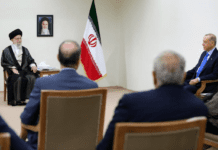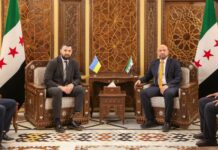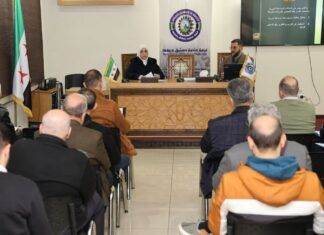
Recently various outlets, including Aydin, a Turkish newspaper, and Russia Today (RT), a television channel with ties to the Russian state reported that Hayat Tahrir al-Sham (HTS) and Ukrainian military and intelligence were in collaboration regarding military operations in Syria, and possibly Ukraine, against Russian troops and bases.
While Russian Foreign Minister Sergey Lavrov has publicly asserted that Ukrainian intelligence is active in Syria, allegedly recruiting militants from Hayat Tahrir al-Sham (HTS) to carry out operations, other top Russian officials have contradicted this narrative. Alexander Lavrentiev, Russia’s Special Envoy to Syria, dismissed such claims that Ukraine has deployed special units in Syria. Lavrentiev emphasized that Kyiv fears sending its military personnel into direct conflict zones such as Syria, contradicting Lavrov’s assertions.
Previous claims by Ukrainians of attacks on Russian bases in Syria were dismissed by Russian media as “psychological operations” intended to bolster Ukrainian morale amid ongoing difficulties on the Ukrainian front. Konstantin Sivkov, a Russian military expert, suggested that the Ukrainian claims were attempts to create “a false sense of success and destabilize the political situation in Russia.”
This discord within the Russian government’s narrative raises questions about the validity and coherence of the allegations against Ukraine. The conflicting statements may signal internal uncertainty or even a strategic disinformation campaign targeting Ukrainian operations and liberated territories in northern Syria.
Beyond the inconsistency among Russian officials, the narrative regarding Ukraine’s alleged partners in Syria has also been muddled. According to some reports, Ukrainian intelligence is purportedly in contact with the Turkistan Islamic Party (TIP), a Uyghur resistance group in northern Syria, to coordinate drone attacks on Russian bases. Other reports suggest that Ukraine is working with Hayat Tahrir al-Sham (HTS), a group more dominant in northwestern Syria, to release fighters to be sent to Ukraine, in exchange for combat drones.
These fluctuating claims highlight a lack of clarity about who Ukraine is supposedly partnering with and on what terms. The narrative shifts from Ukraine offering drones in exchange for fighters to claims that Ukraine is providing drones and training for free, further muddying the waters. Similarly, last year, leaks published by the Washington Post and New York Times that Ukraine planned to work with US-backed Syrian Democratic Forces (SDF) to conduct drone attacks against Russians in Syria.
Hayat Tahrir al-Sham, the group at the center of some of these allegations, has explicitly refuted the claims. In a statement to media outlets, HTS denied any involvement with Ukrainian intelligence, dismissing reports that it is negotiating for the release of Chechen and Georgian fighters allegedly detained in its prisons.
The group’s firm rejection of the reports casts further doubt on the credibility of Russian media narratives. HTS labeled the allegations as part of a “Russian disinformation campaign aimed at justifying further military action in Syria’s liberated areas.”
In addition to the denials, there are significant logistical hurdles that make the Russian claims highly unlikely. Northern Syria, the region in which these supposed operations are taking place, lacks the infrastructure needed for large-scale military coordination between Ukraine and local groups. There are no functional ports or airbases, and the only major crossing is under the control of Turkey, a country with close ties to Russia and a growing diplomatic relationship with Syria’s Assad regime.
This geographical isolation, combined with Turkey’s monitoring of the region, makes the transport of military equipment and personnel from Ukraine to Syria highly improbable. Any direct military cooperation between Ukraine and groups in Syria would face considerable logistical challenges, further undermining the plausibility of such claims.
The accusations that Ukraine is working with Syrian factions to target Russian interests appear to be part of a disinformation strategy from Moscow. Contradictory statements from Russian officials, denials from key Syrian groups, and the logistical implausibility of such cooperation imply the unlikelihood of the scenario presented by Russian media. As the conflict in Ukraine continues, it seems Moscow is using these narratives to maintain focus on external threats while justifying its military actions in Syria.








